How should journalists work in the new media?
Interview with a graduate of George Washington University in the USA, PhD candidate, TV journalist, Jainagul Tolemis
The process of rapid globalization makes every journalist a specialist in international category to the certain extent. It's hard to imagine a journalist who doesn't know at least English and doesn't have the abilities to work with international social networks. There are many journalists and media professionals who have improved their knowledge and mastered the field of communication and media abroad under the “Bolashak” presidential scholarship. The editorial board of el.kz portal interviewed TV journalist Jainagul Tolemis, who studied at the Institute of Public Relations of George Washington University, majoring in Media and Strategic Communications, about education in the USA, the development of the media industry in Kazakhstan and the current state of domestic journalism.

The arrival of Jainagul Tolemis into the journalism field
Jainagul Tolemis is an experienced specialist and television journalist who has studied in America for 4 years and pursued a master's degree since a language course. She has achieved a success in her job and also received a well-deserved award for her work. A journalist had started her career for the first time in 2003 at the regional television channel “Kazakhstan-Aktobe” and grew from the personal news reporter of the regional television channel to the special correspondent of the republican TV channel due to her professionalism, intelligence, dedication to the job and constant search. Nowadays, she supervises a number of research projects in the development of industry and has become a mentor to young journalists. According to Jainagul's opinion, almost all of the journalists who come into the field of journalism are citizens who have made a fateful decision in their lives. A random person in the industry can not stay long. After all, representatives of the elder generation in the creative sphere, who are able to acknowledge and evaluate the talents of young journalists, have been working on the creation of a new generation of young journalists.
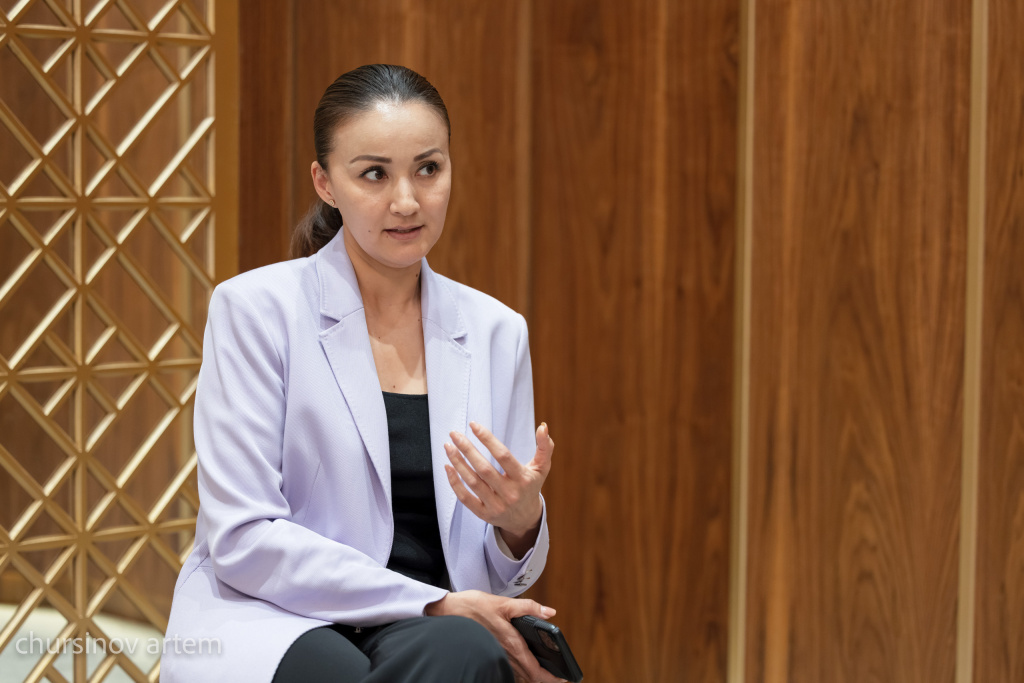
- “A special school for educating young journalists has been established in our country. I believe that the education and example of the older generation are particularly strong in the regions. Since I have become a journalist from the region, I think that our representatives from the older generation are very enthusiastic about training the young journalists. In 2003, at the age of 19, I participated in the competition for dramatic reading named after Oralkhan Bokei. There I took part in the competition by reading the dramatic, poetic, prose works and won a prize. After the competition, my friend Altynai, who was studying journalism at the same time as me, saw me and told me that she was writing an essay after the event and after that she would screen it. Then she asked me to play the role of a character in a love story,” - Jainagul stated.
While Jainagul had been studying at the university, she proudly said that she was trained in the journalism studio by a teacher named Amangali Sater. This man has a special place in the regional journalism of Aktobe region. While he had been teaching at the university, he had worked as the chief editor of the regional television channel for many years and encouraged young talents to go for internships there and participate in various kind of creative competitions.
- “So, Altynai and I came to Amangali Sater after the TV project was ready. At that time, Amangali said, “Jaina, today there will be a competition at the regional TV channel, go there and take part”. When I came to the regional TV channel, I saw that the competition was almost over. I was the last person to enter. Most probably because I took part in a dramatic reading named after Oralkhan Bokei and could have made a well-defined diction. Then, the TV journalist and news presenter Venera Sergazina noticed me in the audition and invited me for an interview. In the same year, two girls out of 70 participants were selected. So, two weeks later, the team brought me to the live newsroom, and when I appeared on the air for the first time, I was only 19 years old,” - said the TV journalist.
So, Jainagul had passed successfully the audition for news anchor and started working at the regional TV channel. Broadcasting the news live was only a part of the job. The hardest part was waiting for her behind the scenes. But Jainagul did not reject any of the offered jobs. She had also combined a job of a news reporter for the regional channel. She is still reminiscing humorously about how she had worked for half a year for free to get a permanent job of a reporter and improve her writing skills. According to the journalist, no matter what kind of opportunity people get, it should not be missed. Besides that, not every journalist is able to pass the school of a strong journalist. Among the experienced journalists who taught her how to write and report the news were Zhanagul Zhursin and Venera Sergazina.
Journalist`s experience in the Presidential Press Corps
Jainagul Tolemis's career in television is full of interesting journalistic work, for which every day is set aside for seconds. In particular, she noted that the years of working in the Presidential Press Corps of the First President of the Republic of Kazakhstan, Nursultan Nazarbayev, were the heralds of the political life of the country.
- “A strong media manager, Lyazzat Tanysbay, was the reason for my resettlement from Aktobe to Astana. She was that person who offered me a job in the Presidential Press Corps during my time at the National Television Channel of Kazakhstan and assigned me to host many important live broadcasts. In general, the reason for my coming into the television industry was the elder generation of professional TV journalists, who once were distinguished at the news of the “Khabar” channel and set an example of professionalism. Among them were TV presenters such as Lyazzat Tanysbay, Dana Nurzhigit, Bibigul Zheksenbay and Svetlana Kokovinets. It seems that the current generation has not been able to replicate the skills they brought into broadcasting yet. I believe that the Presidential Press Corps is a school for political journalists. Not only in our country, but also in America, most of the news about the President is related to political news, so most political journalists are trained in the presidential press corps. Over the years, journalists have been developing their personalities and political literacy by covering events attended by the President. Therefore, working in the presidential press corps requires patience, creativity and continuing research,” - Jainagul emphasized.
She also noted that covering the president's official meetings with other heads of states requires extensive and responsible work for the journalists. First of all, a team must be strong. The journalist is proud to recall that the team members, including cameramen and editors, received several offers from other channels and the TV and radio complex of the President of the Republic of Kazakhstan. Jainagul Tolemis also stated that she had worked at the Presidential Press Corps of the First President of our state for about five years and visited around 50 countries. During one of her working trips, she conceived an idea and decided to go abroad for study. Because, nowadays, it is not enough for journalists to speak only in two languages. She also gave advice to those journalists who want to pursue their careers in the Presidential Press Corps of the current President of our country:
- “A journalist should try to explore the world and get to know other cultures. It is necessary to recognize and compare not only a local culture but also the political culture of other countries. During the activities of the Presidential Press Corps, it is necessary to practice receiving a large flow of information and extracting its core. Journalists often need to be more patient, no matter how much time they have. Secondly, I think journalists should have political literacy as well. I would say that we need the political literacy because we do not have enough information in most cases. For example, when reporting on the activities of politicians visiting certain countries, the information remains incomplete. Therefore, before going on the state visits, I used to meet with diplomats and businessmen, and tried to get as much information as possible. An additional problem with Kazakh-language journalism is the lack of people who can conduct interviews in Kazakh. Perseverance and extra hard work are required to convey information better in many situations. In addition, the most significant thing for journalists is creativity,” - a professional journalist emphasized.
The occasions and events that are shown on the TV screen are only a small part of the situation that happened, and the events that took place behind the TV channel are more important. As a correspondent covering political issues, Jainagul Tolemis made an effort to convey the most accurate information to the audience, highlighting the most significant aspects of the President's meetings with leaders of other countries.
According to the TV journalist's advice, today political journalism is implemented by political scientists.
- “In order not to lag behind them, we need to create a new group of political journalists, including the Kazakh-speaking journalists who cover and write the news on political topics,” - she added.
Pursuing education in America under the “Bolashak” programme
Over the years of independence, eleven thousand Kazakhstanis have studied abroad under the “Bolashak” presidential scholarship. In addition to academic education, these young people went abroad to absorb cultural values. Jainagul Tolemis has studied in the United States for several years and explored a different way of life among the American people. Therefore, she observed the passion and desire of others to learn. She studied at one of the top universities in Washington, named after George Washington, and received a master’s degree in media and strategic communications.
- “This American university was established in 1821. However, the centuries and years have passed, but the libraries of this institution remains the same. There is a rich collection of rare books. You can specify this university not only in terms of book resources but also in terms of human potential. I think that “I am happy”, because our state has provided us with this opportunity. Some people claim that it is not necessary to pursue higher education under the “Bolashak” program. However, if a Kazakh student studies at least a year in one of the most eligible universities in the world and absorbs its culture, I believe that his efficiency to our society will be immeasurable and useful,” - the graduate of the “Bolashak” program emphasized.
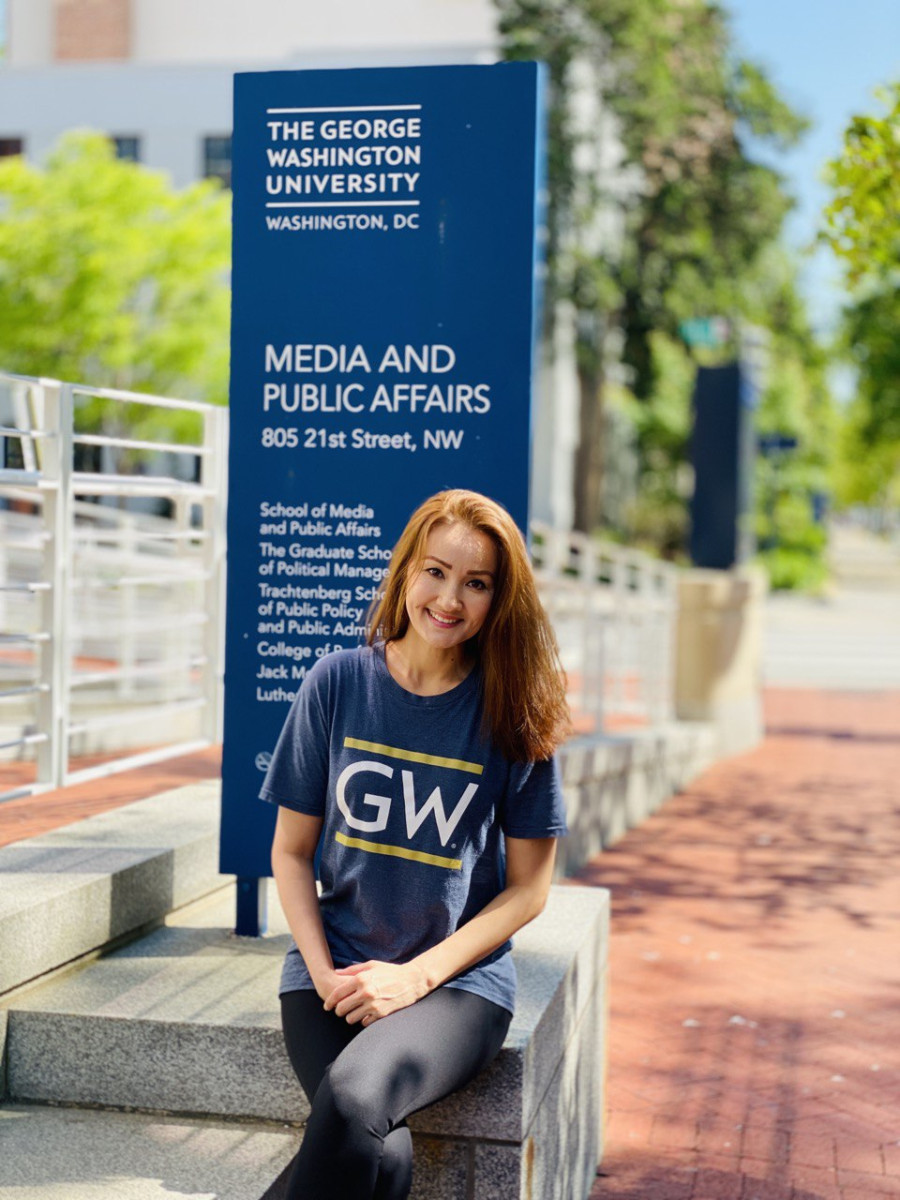
In general, Jainagul Tolemis has four higher educations. Her first education was a Bachelor’s degree at the regional university, then she obtained her education in the central cities of the country, and the last pursued education was in America. According to Jainagul, American universities have their own cultural traditions and customs. The concept of “Cultural tradition” can be interpreted and understood differently. It is a unique culture formed by the people in academic environment, that includes interaction between lecturers and students and other features.
- “When I saw that there is an equal level of respect between the student and the lecturer at Washington University, and that the lecturer puts the student above himself, I noticed that all processes are different in these societies, especially the people are respectful, and every student is valuable”. I noticed it from the way the lecturers treated me and others. “In that environment, I did not see humans, I saw scientists who are dedicated to their profession, ready to devote their lives for their ideas that work a lot for the development of their students,” - a masters graduate of George Washington University highlighted.
When it comes to Jainagul’s specialty in the United States, she pursued a master's degree in media and strategic communications. A journalist investigated the history of the media from a historical point of view and studied the peculiarities of media development in developing countries.
- “The development of the media cannot be seen in isolation from the development of the political system. The cultivation of the media cannot be dissociated from the development of the economy. For example, when I was investigating the cultivation of media in East Asia, I realized that certain changes in the media have a greater impact on society than others. I think it’s important that you look at this. When I was at university, we were taught by the director of the Institute of Diplomacy, who investigated the media development in Malaysia and observed the history of the publication “Malaysia kini”. Over the years, he had studied the history of the Malaysian edition, arguing that if religious rhetoric grows in the country, it will have a significant impact on media development. And, if the rule of law is highly valued in the country, so it will affect the media as well. In general, there are many indicators that influence the correct development of the media,” - a specialist said.
The second area, in which Jainagul specializes, is called “Strategic Communications”. Strategic communication is when any institution is talking to the public or the government is talking to the people. Basically, it is the strengthening of the relationship between power and the masses.
- “Now we hire journalists as communicators”. But can a journalist be a good communicator? To work as a communicator, journalists need to know and learn how to communicate with certain groups of people, and pay attention on whether the messages are clear and whether the channels are chosen correctly for those people. It’s a field of science. A child has his own language, an adult has his own language, and each group has its own language,” - the graduate of the Faculty of Media and Strategic Communications added.
What should we learn from America in the field of media and communication?
According to Jainagul Tolemis, a new era gives journalists more possibilities than before. The journalists, like American journalists, should make maximum use of social media.
- “Now, social networks have a great opportunity. It is an indicator that motivates self-discipline, self-development, and continuing research. For example, you can quickly get feedback on what is being written now. The readers will not just read your article, but they will immediately express their point of views. Due to this, a journalist grows along with the readers. The main US publications work with Data Mining, Data Science, Analytics, Big Data. We need to learn these things too,” – Jainagul noted.
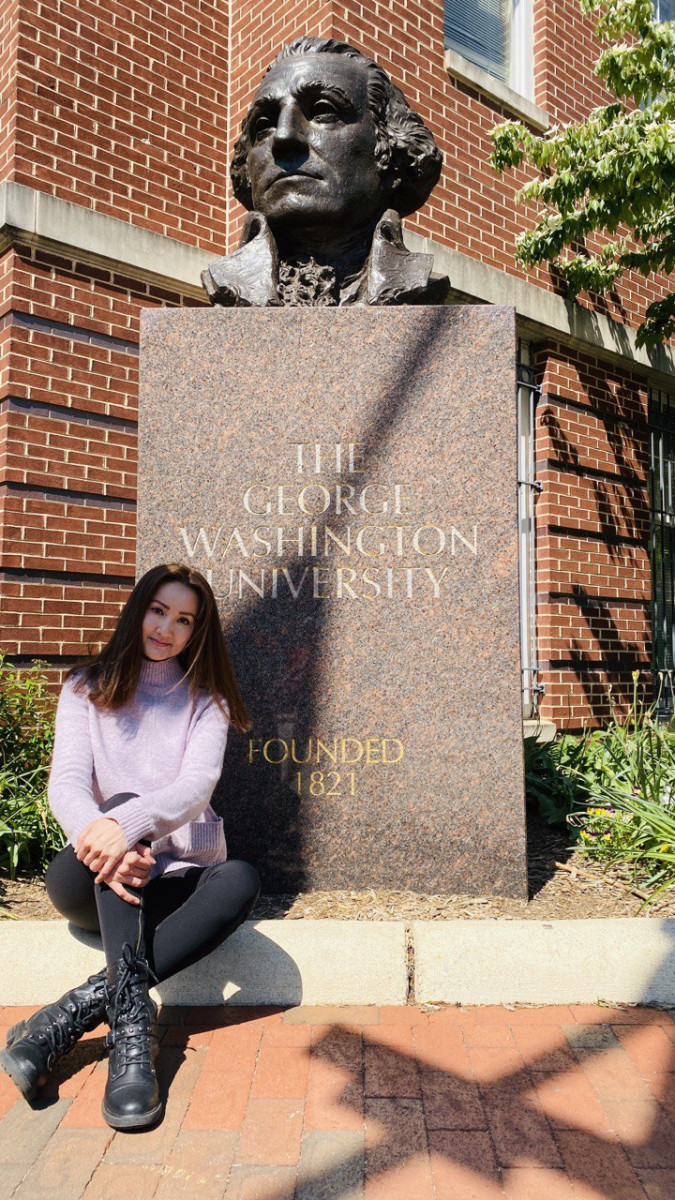
So, one of the most essential things you should learn from American journalists is communication skills and soft skills.
Is it possible to apply theoretical knowledge gained in the USA to our country?
- “Actually, research can be conducted within certain private institutions. Secondly, if we take into account the field of communication within a particular group, you can improve your internal and external communication skills. So there are many possibilities. Currently, we are conducting research in the field of media,” - the expert in her field said.
How competitive is domestic media in our country?
In the context of globalization, we are convinced that the political life of modern society is impossible without the mass media, information technologies and social networks. The flow of information becomes a real information flow in which it is considered difficult to find a way for well-educated specialists. In this regard, the media sector in the country has been developing rapidly.
- “We stated that the development of the media industry goes hand in hand with other industries. I want to emphasize that this is technological development. For instance, when I first entered the television industry in 2003 and was a budding journalist in the region, this was considered a “big kitchen”. I saw a boiling cauldron of journalism and grew up among those journalists who went through hardships. There were also reporters, who couldn’t find a place to write the anchor’s words, news scripts and other stuff. I still remember how four journalists divided a piece of paper into four parts and read it aloud from the same small pieces of paper in 2003. There was no social situation. Nowadays, we have the technological possibilities, a media center, technical conditions, different types of lighting, all of which proves how much progress has been made in the field of media over the past 20 years. And, as the journalist who sees it, can definitely adjust to the opportunities provided by the state. This does not mean that there have been no changes in the industry,” - Jainagul Tolemis noted.
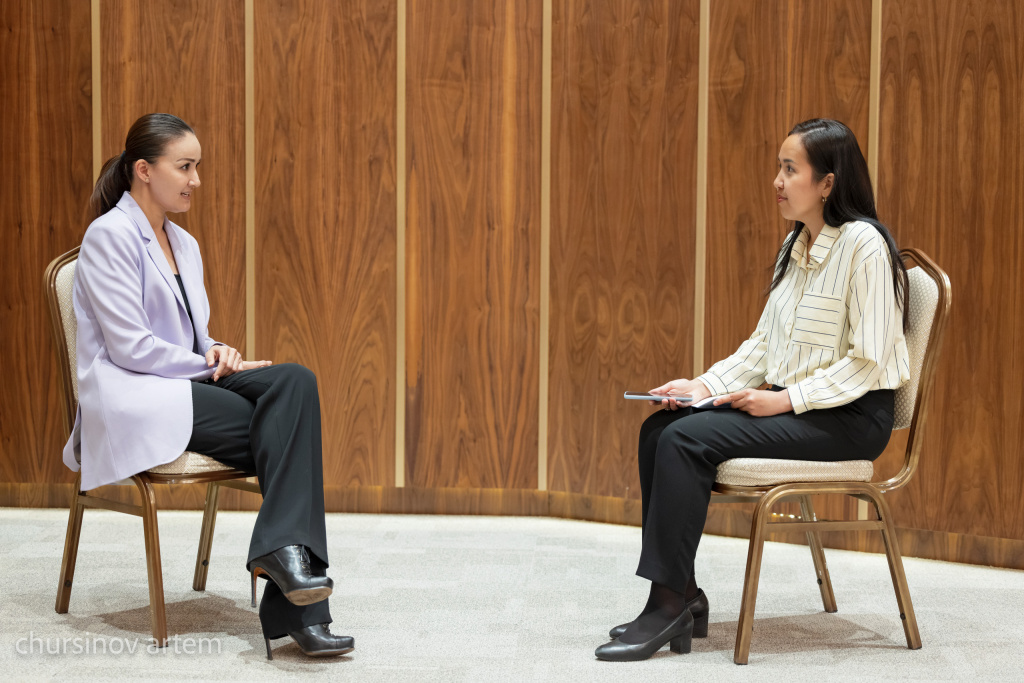
In general, nowadays, our society has been developing in various directions (for instance, a concept of “sustainable development”). It is necessary to reconcile the views and values of the previous and present generations. A new generation of journalists is being formed and prepared as well.
- “There are already 300 journalists and media workers who have been trained abroad. Most of the journalists who have been educated abroad go back to work for the regions. They are taking part in training journalists at regional universities. These things are often invisible, but in the end, they will pay off and make sense. They will obviously contribute to the development of a qualitatively new generation of journalists. Previously, journalists were not included in the list of “Bolashak” scholarship. It can be explained that it usually contributes to solving spiritual and personnel issues. Among us are some of my contemporaries who graduated from Columbia University and Boston University in the U.S. In general, you need to be able to see the advantages. In most cases, the whole world is not gone. I think it will qualitatively affect the society,” - the TV journalist stated.
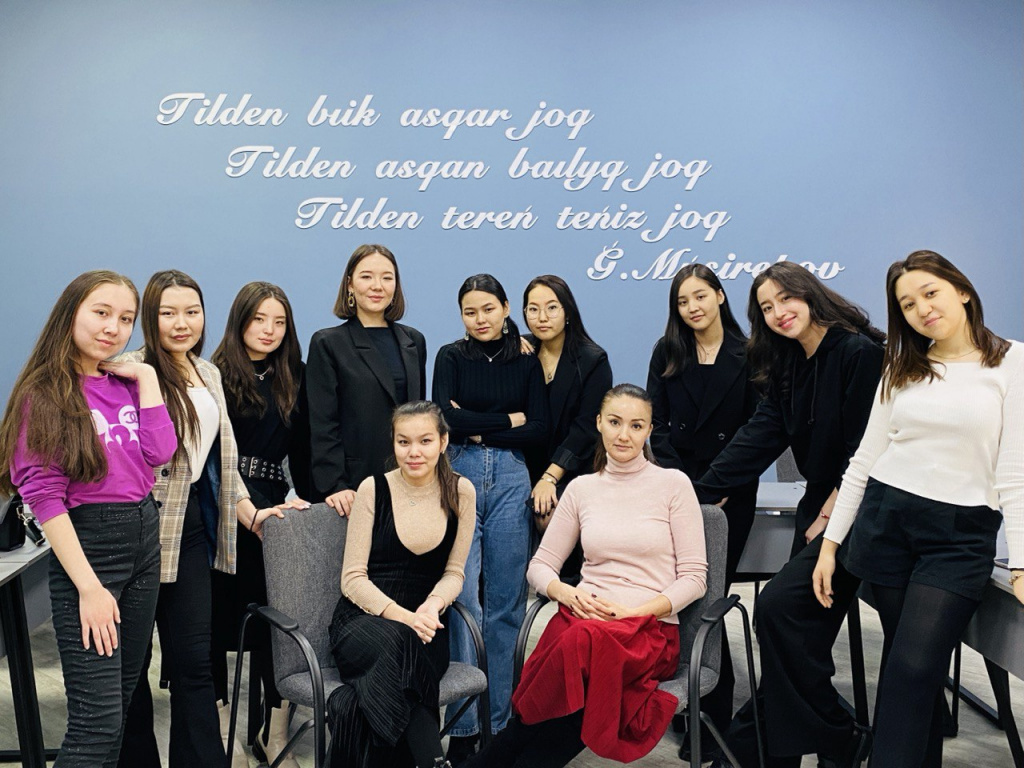
Priorities and perspective of Kazakh-language media
The demand and request for Kazakh-language content in the country is very high. Journalists have many opportunities to improve their professional skills.
- “What pleases me is that the older generation is making a significant contribution to the training of the next generation of journalists. After all, a lot of older people comment on what journalists write. Today, young people do not refer to the newspapers or television to search for respected journalists or ask them to criticize their work. They often see the comments of others on Facebook. In particular, the recordings of Kainar Olzhai are worth it. Young people immediately conclude that you cannot write like this. That is why the notion of distance has been eliminated in the new media. The second problem is that there are a lot of informational and educational websites. The number, in some ways, shapes the quality of journalism. Other than this, there are more opportunities for journalists to acquire education and improve their professional qualifications. The number of vocational training schools and media schools have been increasing. If a journalist would like to expand their knowledge, he has a lot of possibilities. For example, journalists may go to study abroad, or can take a lot of advanced training courses under the Media Development Foundation and get free certificates. In addition, there are a number of non-governmental organizations involved in the popularization of media literacy,” - the TV journalist said.
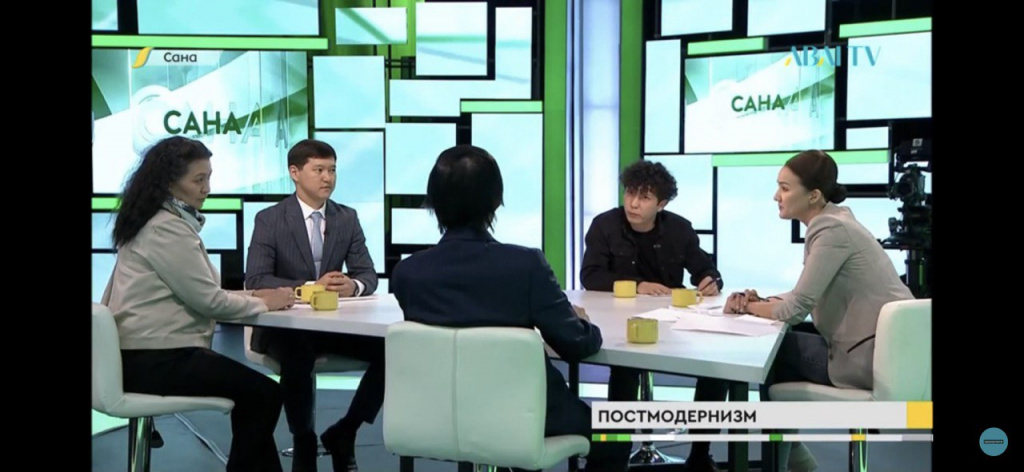
In addition, now the television channels are engaged in the development of specialists. For example, the National Channel of Kazakhstan has opened a media school. There is a special attention paid to the training of young journalists. At first glance, all of these actions help to increase the competitiveness of professionals in this field.
- “There is a term called “devaluation”. This is an attempt to do something useless. It is necessary to be able to see and differentiate qualitative changes in the industry. You can observe how many Kazakh-language sites are launched these days. From these websites you can see a narrative storytelling in the Kazakh language, the interactive formats used, and the remarkable longreads that are considered as a reflection of the industry’s distribution in terms of genre. My students come to me to find and check the longreads published in the Kazakh language. When you see and investigate the new formats, you are excited about a new generation of creative journalists. Another trend I notice is that an educational function of journalism is becoming increasingly active. It might have been influenced by Covid pandemic. I am pleased that after the rain of websites focused on mushrooms, the number of cognitive websites has increased significantly. There are a lot of Internet projects as well. I think it shows that young people are trying to turn into educational journalism,” - Jainagul Tolemis added.
(The pictures were captured by the photographer and derived from the personal archive of the journalist)
 Subscribe to our Telegram channel and be the first to know the news!
Subscribe to our Telegram channel and be the first to know the news!